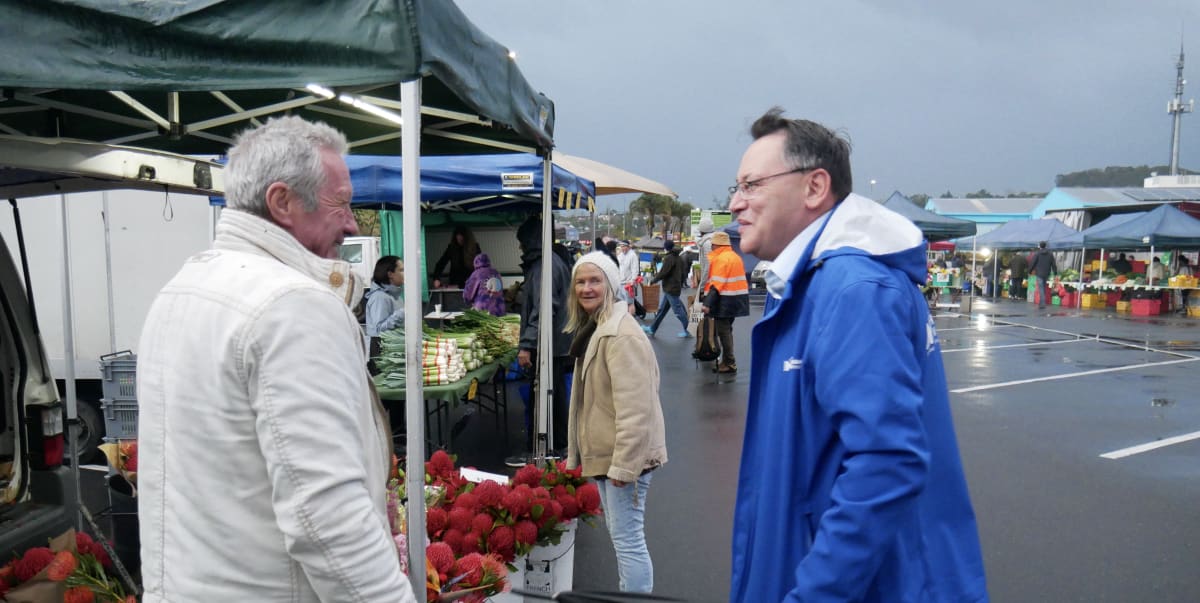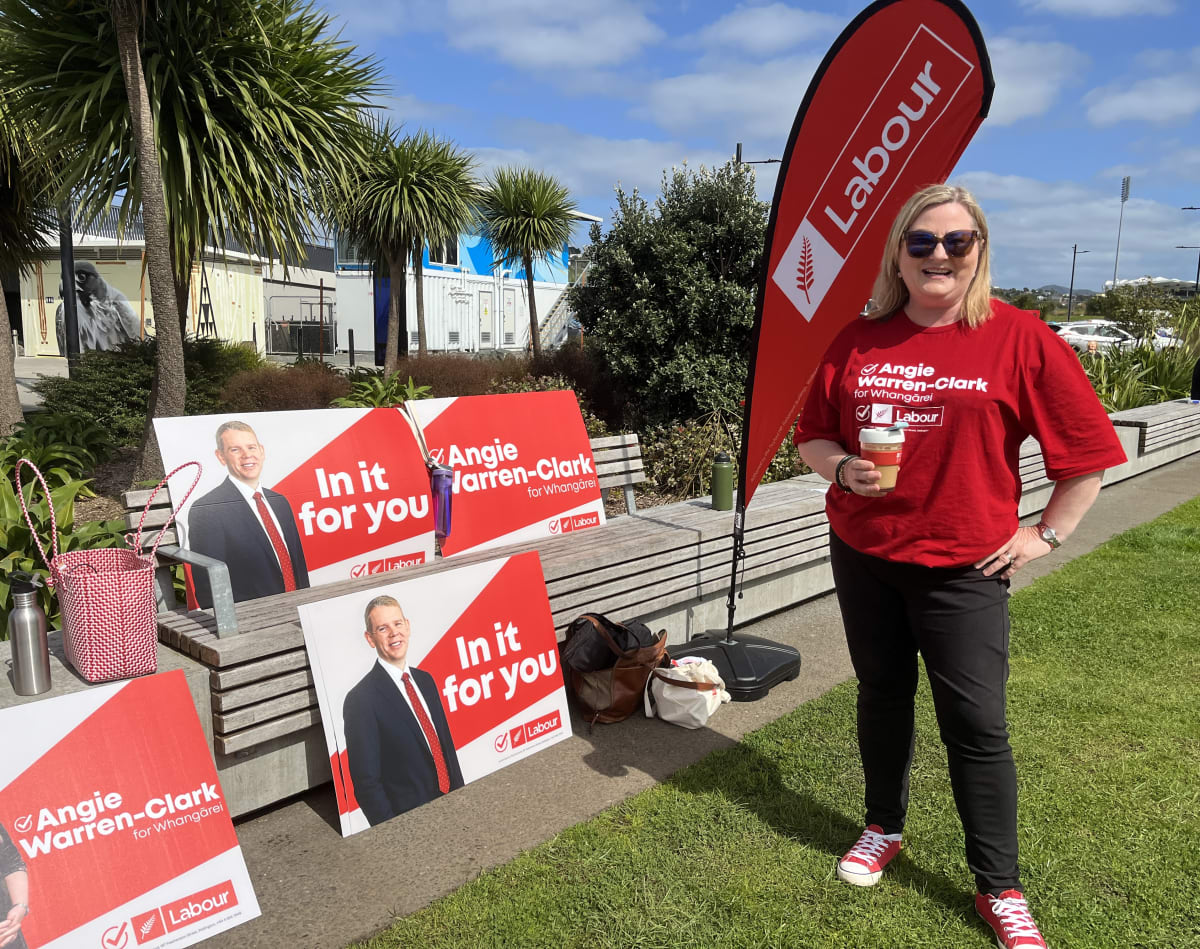
Dr Shane Reti is quietly confident in Whangārei – but did 2020 show the country that the northern electorate can be anybody’s for the taking?
The 2020 election was a real nail-biter for Whangārei.
National’s Dr Shane Reti seemed to have taken the seat for a third term by a margin of just 164 votes.
But as the results trickled in from special votes, Reti’s hold on Whangārei was weakened until on November 6, Labour’s Emily Henderson was announced as the winner.
READ MORE:
* The Battle for Northland
* Tensions flare in Northcote
It was an historic election for the Northland region, with Labour taking all three seats of Whangārei, Northland and Te Tai Tokerau at the same time for the first time ever.
Whangārei was one of many electorates that swung from its usual blue predilections to install a Labour MP – in this case, for the first time since 1975.
However, even with the strong early pandemic support Labour enjoyed, Henderson only beat Reti by a slight 431 votes.
And three years on with dwindling polling figures for Labour, swing voters appear to have moved back across the aisle to National, or rekindled an old interest in New Zealand First.
So what does all of that mean for the near 100,000 people who call this electorate home?
For Reti, National’s health spokesperson, it means quiet confidence.
Newsroom caught up with Reti as he visited Whangārei’s Growers Market on an inclement Saturday morning. Despite the weather, he was in a sunny mood, stopping in at local farmers' stalls and making small talk.
Reti said visiting the market every weekend was something of a ritual for him, letting him reconnect to the community after a week in Wellington.
But in 2020, his hometown very narrowly told him they didn’t want him as a representative.
Three years on, he likes his chances for a comeback.
"We don't want to take anything for granted, but we are quietly pleased with where we are at the moment,” he said.
When a passerby greeted him as minister, he said they were a bit early: “But let’s just see in two weeks.”

Reti said support for his campaign on the ground seemed to be stronger than ever before.
“I've got the strongest ground game I've ever had,” he said.
He’s seen people who aren’t members of the party reach out to help make sure he gets over the line.
“I had half a dozen people who aren't even members call the office and say, Shane can I put a sign on my farm.
“That's a little bit more than just nice words in passing These people weren't even members, I wouldn't have known them from Adam.”
But why this new swell of support?
Reti said he’d surveyed the electorate and found cost of living and crime were the priorities. That’s what politicians across the country have been reporting.
But in both Whangārei and Northland, roads have pushed their way further up the list than in other parts of the country.
The extreme weather of early 2023 highlighted the vulnerability of Northland’s transport links, with closures to the Brynderwyns and Dome Valley forcing travellers onto small and windy rural roads not built to act as the main bridge to the region.
Four lanes from Whangārei is a big part of Reti’s platform. He said earlier moves to do something about the Brynderwyns would have saved millions of dollars when the weather turned wild.
“When the Brynderwyns went down ... the damage to the two routes that acted as proxies was around $50 million each,” he said. “That’s a $100 million hit. Now, when we fixed the north side of the Brynderwyns it was $50 million. So you think, if we'd had the south side ready, it would have saved that much.”
Other big hits for Reti are crime – Whangārei’s downtown police counter closing at 6pm is a local bugbear – and long waits for GP appointments.
As a GP himself, he said he knew the game and how to improve things.
“With the waiting times it's always things like terms and conditions, and wage and salary. It's issues like remuneration,” he said. “GPs: there are not enough of them, they’re working too hard, too many hours, and the administrative burden is two to three hours of admin at the end of the day.”
Sheltering from the rain, he told some market vendors that as a medical professional he knew the ins and outs of the health sector, criticising Andrew Little’s tenure in the role as somebody who just did what officials told him.
“Then what about Verrall?” one of the men asked him. “It’s like an ex-football player doesn’t necessarily make a good manager.”
Reti nodded sagely, but wasn’t clear about where that put him.
In 2020, Reti was ousted by Emily Henderson, a first-time candidate and Family Court lawyer. But in March this year, she announced one term was enough and that she was going back to her “real calling” in court reform.
Henderson has also reported “intense” incidents during her time as MP, with people accusing her of “war crimes” over the government response to the pandemic. The Northern Advocate reported a situation where anti-vaccine mandate activists threatened to throw bricks through the windows of her home.
Angie Warren-Clark, Papamoa-based and 53rd on the Labour list, got the shoulder tap to take over. The former Tauranga Women’s Refuge manager was raised in Northland and saw her selection as a bit of a homecoming.

Henderson is bridging the gap by acting as her campaign manager. However, that ultimately does little to help the fact that Reti’s profile in Whangārei massively outweighs Warren-Clark’s.
So how does a hopeful political candidate get around that?
Warren-Clark said she was focused on raising turnout and providing factual responses to claims Labour hadn’t done anything.
She pointed to the Whangārei Hospital redevelopment and state housing under construction.
Whangārei has long been a National stronghold, but Warren-Clark said that didn’t make sense, saying Labour’s centre-left social interventions could provide a better fix for a city with relatively high social deprivation.
Warren-Clark argued there was a communication issue – it being harder to explain how children involved in youth crime should be treated when you can’t fall back on “lock ‘em up” catch-phrases.
“The problem is there’s no bouncy slogan for putting those kids in wraparound services,” she said.
She’s also been focused on driving up voter turnout – a high voter turnout is usually good news for Labour.
Warren-Clark said in many door-knocking encounters she’d tried to convince people to register to vote.
“A lot of doors we knock on, people say they’re not enrolled and said there’s nothing in it for me,” she said. “So our campaign in many ways has been about increasing voter turnout.”

But Whangārei – the hometown of Winston Peters – has always had a soft spot for his party as well. Perhaps it’s the Provincial Growth Fund, which has earned Peters and his right-hand man Shane Jones esteem north of the Brynderwyns.
Jones himself ran in Whangārei in 2017, taking roughly the same number of votes as Labour’s Tony Savage.
This time around Jones is running for the Northland seat, while former police officer Gavin ‘Sarge’ Benney is going for Whangārei and hoping to join Winston’s team in Parliament one way or another.
Benney spent the past six years as a Whangārei District councillor and is campaigning with stricter sentencing for youth crime at the forefront.

Whangārei is an electorate that has seen a wide range of high-profile politicians throw their hat in the ring. The likes of David Shearer, Shane Jones and John Banks have all had a go.
For a long time, it seemed the blue tendencies of Whangārei were impossible to budge. Forty-five years of unbroken National success seemed as immutable as gravity.
2020 changed that tune – showing even a National stronghold like Whangārei could turn red.
But even if past trends don’t indicate future performance, circumstances point towards Reti’s confidence being validated come October 14.
Politics, however, is never a sure game. As he watches the election results pour in with his team at the Whangārei Club on that Saturday night in just under two weeks, perhaps even Reti’s fingers will be crossed under the table.







